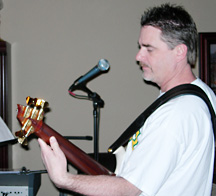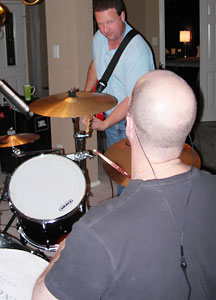Updated: 3/02/07
|
| Yvette and Kevin Snow are part of From the Dust, a music group that ministers in prisons throughout Texas. |
‘From the Dust’ takes music behind bars
By George Henson
Staff Writer
THE COLONY—Like missionaries Paul and Silas in the New Testament, band members of the Christian band From the Dust hope taking their songs to prisons might cause inmates to ask, “What must I do to be saved?”
From the Dust grew out of a church praise band that led worship on Sunday mornings.
 |
| Kevin Snow, bass guitarist and vocalist for From the Dust. |
| • Watch video clips about the ministry of From the Dust here and here.
• Hear their blues version of Blessed Assurance.
• Listen to more music at their website, www.fromthedust.com. |
“We started praying, because we wanted to do more,” said Pat Callaway, the group’s drummer. “We talked about it and talked about it, and there was a guy doing sound at the church who got tired of hearing us talk about it and told us to do something about it.”
Like other bands, From the Dust began by playing at youth events and in churches, but gradually those opportunities dried up.
A relative of Callaway helped the band nab an invitation to perform in a prison. Even though they felt apprehensive at first, they decided God had opened the door, and they walked through it.
And while they continued to look to churches as venues, all those doors closed.
“We tried to do some community events and other things but walked away from them saying, ‘We probably shouldn’t have done that,’” Callaway recalled.
After that initial prison concert, however, other prison chaplains began to call. More importantly, From the Dust members began to sense God’s call.
“We wouldn’t ever have dreamed of playing in prisons, but that is where God has directed us,” said Kevin Snow, bass guitarist and vocalist.
“For me, it was a spiritual awakening to be around a lot of people—many of whom had problems all their lives—and to tell them about Jesus in a way they maybe hadn’t heard before,” Callaway added.
All the From the Dust members have a long history playing in bands—and not always churches. All have played in clubs and bars, and they participated in the lifestyle expected in those venues.
 |
| Drummer Pat Callaway and lead guitarist Mitchell Martin. |
“All of us have dabbled in drugs and alcohol, and some us have more than dabbled,” Callaway admitted.
“But it’s interesting that God uses our mistakes with drugs and alcohol to connect with guys we probably wouldn’t connect with otherwise,” Snow added.
The band typically begins with songs that have a hard-driving rock-and-roll beat and gradually moves toward more worshipful music, preparing inmates to hear the message lead guitarist Mitchell Martin preaches.
Martin and his wife, Cissy, are members of Legacy Drive Baptist Church in Plano. Their bandmates are active in other Dallas-Fort Worth-area churches.
Prison inmates “connect with the music first, and then we can talk to them,” Callaway explained.
So far, 360 prisoners have said they have accepted Christ as Savior following a From the Dust concert.
“The worship experience in a prison is something else,” Callaway said. “They are down so low, they have no inhibitions about raising their hands in praise or anything else.”
God confirmed Snow’s calling for the band last November, he said. He went to hook up the trailer with all the band’s sound equipment, and it had been stolen.
“It didn’t occur to any of us to quit, but we just went to work sending out letters to friends and family, explaining the situation, and more money came in than we needed to replace the things we lost,” he said.
“When we saw that, we said, ‘This is a confirmation that God’s not done with us yet.’”
Band members made a list of what they needed to continue and a second list of instruments and equipment they would like to have. Both lists have been filled.
Money not only came from family and close friends, they said, but also from people they went to church with years ago. Most touching was the money from missionaries and the spouses of inmates who had little to give but still contributed out of their meagerness.
The experience has made From the Dust stronger, Martin said. Prior to the theft, the band members had pretty much been going it alone. Now, they not only have financial supporters, but, more importantly, an army of prayer warriors.
“God wants his people on mission,” Martin said. “That doesn’t mean going to China or even to prisons with us. They can do it by praying or whatever, but we’re always called to be on mission with Christ.”
While the band has had nothing but good experiences behind the walls of Texas prisons, John Denton, one of the group’s sound engineers, admits his first time was stressful.
He recalled looking up at a cross wrapped in razor wire atop the chapel. “It was very intimidating to walk up to the razor wire and have the lock behind you. I was nervous as a cat,” he remembered.
“Also, those guys were up on the stage all together with everybody watching them. I was in the back all by myself.”
Yvette Snow, From the Dust’s lead vocalist and keyboard player, said the band no longer is afraid.
“They treat you like gold. They are so appreciative that you have taken the time to come and play for them,” she said of the inmates.
Ninety-five percent of all prisoners who have been incarcerated for more than five years receive no visits from family or friends, Martin added.
Cissy Martin, the group’s manager and prayer warrior, recalled one time when the group was singing the song “I Can Only Imagine.”
“The Spirit impressed on me to go to the front and look at the inmates’ faces,” she recalled. “I saw the tears on their faces and noticed one man in a wheelchair. I’m not supposed to have any interaction except for shaking hands, but I bent down and put my arms around him and told him: ‘Won’t it be great? When we get to heaven, we won’t need wheelchairs.’”
“It really is great to see some of them come in with that hard ‘you’re not going to get to me’ look on their faces, and to see that just melt away as we sing about the love of Christ,” Kevin Snow said. “That’s the miracle for me, to see God chip away at their hearts.”
“We get to watch dead people come to life,” Mitchell Martin said.
Along with the calling, God also has given the group a gift.
“God has given us contact lenses to see the man, see the woman, but not the crime, not the place. God has given us the ability to see past the sin,” Yvette Snow said.
But it is the calling that brings them to two prisons a month, nine months out of the year.
“It’s just the absolutely fantastically glorious feeling of being in obedience. The Bible tells us that if we don’t praise him, the rocks will cry out. Well, we cannot not do this,” Yvette Snow continued.
“It’s a calling,” Mitchell Martin said. “God has put it in my heart to do this. It’s my joy to serve. Service to God is a joy, not a duty.”
News of religion, faith, missions, Bible study and Christian ministry among Baptist churches, in Texas, the BGCT, the nation and around the world.





